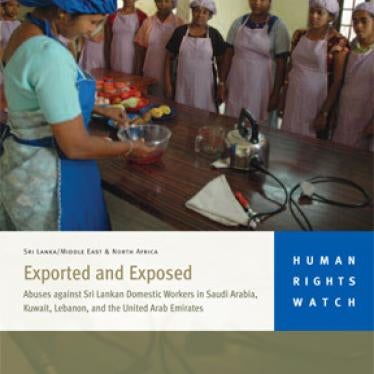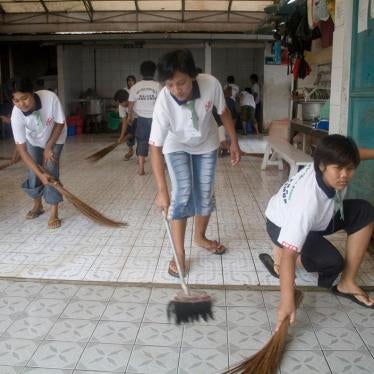To participants in the Colombo process, including governments in Asia and the Middle East, and the International Organization for Migration (IOM):
We, the undersigned groups, represent migrants’ associations, trade unions, human rights groups, and other civil society organizations across Asia. We are writing on December 18, 2007, International Migrants’ Day, to call upon you to implement key reforms to respect and uphold migrants’ rights.
On January 21-22, 2008, the United Arab Emirates will host the latest round of the “Colombo Process,” a series of regional consultative processes focused on Asian contract migrant workers. We believe this meeting could provide an important stepping stone to establishing regional minimum standards regarding recruitment, employment, and protection of migrant workers.
Tens of millions of Asian men and women work as fixed-contract migrants in both Asia and the Middle East, typically in domestic work, construction, manufacturing and agriculture. While many migrants are able to realize dreams of earning money and visiting new places, others are deceived about their working conditions, cheated out of the rightful wages, abused by their employers, and deported without access to redress.
Extensive documentation and experiences of governments, UN agencies, NGOs, trade unions, and migrants’ associations have clearly and repeatedly highlighted specific labor and immigration policies that expose migrant workers to human rights abuses. We call upon you to address the following five reforms in the agenda for the January meetings and to make commitments toward their realization:
Extend equal protection to domestic workers under labor laws
This includes provisions for one day off per week, overtime pay, limits on salary deductions, access to labor courts, annual leave, and other benefits. Establishing standard contracts or separate laws with weaker protections than those in existing labor laws are not a substitute for providing domestic workers equal protection under the law.
Reform the kafala or “sponsorship” visa system
Employment visas that tie workers to their employers make it difficult for workers to change employers, even in cases of abuse, and sometimes require them to obtain their employer’s consent before leaving the country. Recent reforms have not gone far enough and can be easily exploited by employers and recruiters. Workers’ visas should not be linked to employers.
Increase regulation and monitoring of labor recruitment and placement agencies
Both sending and receiving countries have a responsibility to establish minimum standards for labor recruitment agencies, monitor them rigorously, including through surprise inspections, and to punish those that exploit or abuse migrants. Governments should set clear standards for recruitment fees or eliminate them completely.
Ensure migrants have access to justice and support services
Migrants who face abuse often suffer double victimization. To ensure equal protection under the law, and to respond to forced labor and trafficking, governments should 1) provide support services for abused migrants, including shelter, medical care, counseling, temporary residence status, and access to legal aid; 2) speedy and transparent mechanisms to resolve wage disputes, claims of mistreatment, and other employment issues; and 3) prosecute cases of abuse against migrants through the criminal justice system.
Ensure migrants enjoy due process
Migrants who find themselves in conflict with the law, or who are accused, justly or unjustly, of committing crimes may not have access to interpreters or legal aid undermining their right to a fair hearing or trial, including the right to adequately prepare and conduct his or her defense. Governments should ensure that migrants have access to interpretation, consular officials, and legal aid in the case of arrest for an alleged crime.
We also call upon the conveners of the Colombo process, including the International Organization for Migration, to include representatives of migrants’ associations, trade unions, and NGOs in such regional dialogues. And finally we urge governments to ratify and enforce the Convention on the Rights of Migrant Workers and Members of their Families and other relevant international United Nations and International Labor Organization (ILO) treaties.
Thank you for your attention and we look forward to hearing from you.
Sincerely,
Action Network for Migrant Workers (ACTFORM)
Sri Lanka
Asia Pacific Forum for Women, Law and Development (APWLD)
Thailand
Asian Domestic Workers Assembly (ADWA)
Asian Migrant Centre
Hong Kong
CARAM-Asia
Malaysia
Center for Indonesian Migrant Workers
Indonesia
Center for Migrant Advocacy
The Philippines
Coalition for Migrants’ Rights
Hong Kong
The Confederation of Public Service Independent Trade Unions (COPSITU)
Sri Lanka
The Free Trade Zones & General Services Employees Union (FTZ&GSEU)
Sri Lanka
Human Rights Watch
Humanitarian Organisation for Migrant Economics (HOME)
Singapore
International NGO Forum on Indonesian Development (INFID)
Migrant Care
Indonesia
Migrant Forum in Asia
The Philippines
Migrant Services Centre
Sri Lanka
National Workers Congress
Sri Lanka
The Progress Union
Sri Lanka
Solidaritas Migran Scalabrini (SMS)
Indonesia, the Philippines
Tenaganita
Malaysia
Transient Workers Count Too (TWC2)
Singapore








